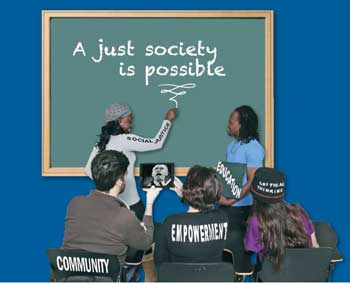On May 22, three great Canadian progressives, rabble.ca co-founder Judy Rebick, the actress and activist Shirley Douglas, and mayoral candidate Olivia Chow will be speaking at the Tommy Douglas Institute’s conference “Critical Pedagogy and the Citizen-Student” at George Brown College in downtown Toronto. As mentioned in my last column, the Tommy Douglas Institute was launched this past year with the goal of rethinking pedagogy in an era of neoliberalism. The May 22 conference will ask: What is the role of post-secondary education in promoting democracy and citizenship in our era? And how do today’s educators take on the challenge of graduating students who are stewards, not just residents, of society?
Judy Rebick will deliver the keynote speech “Learning from the New Movements” at the conference. Along with her considerable activism, which has included leadership of the National Action Committee on the Status of Women (1990-1993), Rebick is also the author of a number of inspiring books, including Imagine Democracy, Ten Thousand Roses: The Making of a Feminist Revolution, Occupy This, and my own favourite, Transforming Power: From the Personal to the Political. The latter discusses a variety of progressive mobilizations and governments, including the World Social Forum, feminism, environmentalism, indigenous ideas, and the challenges posed by nominally progressive governments.
In Transforming Power, Rebick notes that we have moved beyond the time when activists believed that taking control of the state was the pivotal first step to changing society. The past generation has demonstrated that progressive political parties, when elected, regularly disappoint their supporters. Two examples include the African National Congress (ANC) in South Africa (1994 onwards) and the Ontario New Democratic Party in Ontario (1990-1995) which, despite notable advances, did not deliver on the grander hopes that they had inspired. Through her discussions with various political players, Rebick explains how leftist governments’ ability to deliver on their promises depends on the pressure exerted on them by activists, students and citizens. An example is the Workers’ Party in Brazil which, during the Lula presidency (2002-2010), brought 20 million people out of poverty because social movements forced the government to remain committed to decreasing destitution.
Thus community organizers should not put their signs down when their party is elected but instead should assume that a new stage of protest has to begin — one that is primarily focused on ensuring progressive policy rather than consolidating continued power. Rebick points out that some of the innovation of the 2008 Obama campaign — stretching beyond obvious networks, mobilizing through diverse geographic and online communities, and developing leadership among the marginalized, can aid in building up citizens, social movements and political parties that will hold elected officials to their promises.
Rebick’s writings are the insightful and admirable reflections of someone who has maintained an enduring, principled commitment to social progress while always being willing to re-imagine the paths to her goal. On May 22, she, along with two other great Canadians, Shirley Douglas and Olivia Chow, will speak at George Brown College as part of the Tommy Douglas Institute’s 2014 event on pedagogy, citizenship, and students. To register for the conference click here.
Thomas Ponniah is an Affiliate of the David Rockefeller Center for Latin America Studies and an Associate of the Department of African and African-American Studies at Harvard University.



